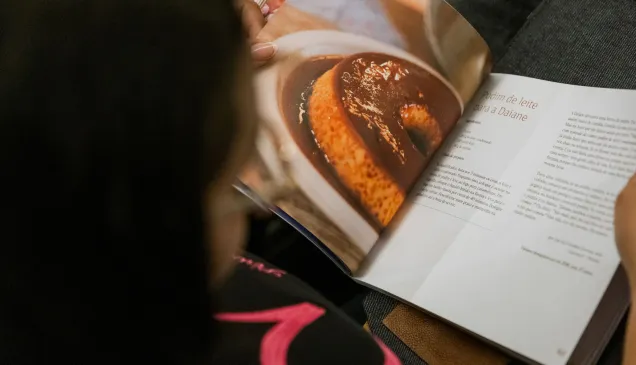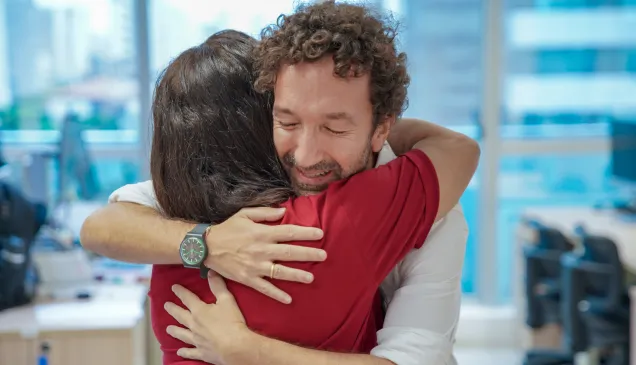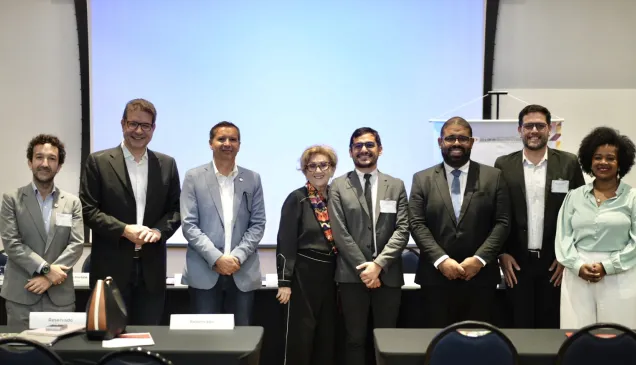The Regional Delegation of the International Committee of the Red Cross believes that the pandemic poses an additional challenge to populations that have been impacted by violence and disappearances, migrants and people deprived of their liberty; the organization provides an account of its activities in Brazil and Southern Cone countries in a report
Brasilia (ICRC) – The Covid-19 pandemic has placed an added burden on the most vulnerable populations, including communities that have been impacted by armed violence, migrants, families of people who have disappeared and those who are deprived of their liberty. This challenge has been identified by the International Committee of the Red Cross in Brazil and the Southern Cone countries in its 2020 Humanitarian Report, released on the eve of the one-year anniversary of the pandemic's onset.
Download the full 2020 Humanitarian Report herE IN SPANISH
"It's very challenging, responding to the pandemic in populations and communities that are impacted by armed violence in Brazil," said the head of the ICRC's delegation, Simone Casabianca-Aeschlimann. "The social and economic conditions alone have made it difficult to strictly comply with preventive measures. The dynamics of violence have exacerbated the situation, for example in the invisible barriers they create, which impede access to essential services."
Even during a year in which the population has been living under the pandemic for ten months, data from the Violence Monitor (a partnership between G1, the Brazilian Forum on Public Security and the Center for the Study of Violence at the University of São Paulo) has revealed that violence has not let up in Brazil. The country posted a 5% rise in murders in 2020 compared to 2019, following two consecutive years of a decline. According to the Fogo Cruzado (Crossfire) platform, 1,556 shootings were reported around health facilities in the metropolitan region of Rio de Janeiro in 2020. The attack on public service professionals affects the entire community because it leaves the public unassisted.
The ICRC has pinpointed efforts to mitigate violence on essential public services, which are under additional pressure within the environment of a pandemic, as operational priorities for 2021. The organization's activities will also continue to prioritize the migrant population through direct and coordinated work with other actors in Roraima; the families of missing persons, with direct support and technical advice to authorities; and also with people who have been deprived of their liberty – who are particularly vulnerable to infectious diseases within detention centers.
Casabianca-Aeschlimann explains, "We have adapted our responses and are working with partners at the federal, state and municipal levels in the cities where we are present, like Boa Vista (RR), Fortaleza (CE) and Rio de Janeiro, on these highly relevant humanitarian issues."
Despite the challenges, the head of the ICRC delegation has an optimistic view of the potential for a response, especially through coordination and collaboration. "We're certain that solidarity and empathy are essential to overcoming adversity. That's why we depend on our partners, supporters and allies to accomplish our work, as well as on the trust placed by the families of missing persons, migrants, essential services professionals and other people and communities we serve," she related.
Accountability
In its 2020 Humanitarian Report, in addition to outlining this year's challenges, the ICRC provides an overview of the work performed in the region covering Argentina, Brazil, Chile, Paraguay and Uruguay over the past year. Whether through direct actions or partnerships, essential services staff and the community they serve in six Brazilian cities were benefited through the Safer Access (AMS) program – an initiative designed to prevent and mitigate the impacts of violence on essential services. The ICRC has also worked directly with migrants and the community that has received them in Roraima through donations, providing access to fresh water and a service to reestablish contact between family members who are far from each other, including responses to the prison population and support to family members of missing persons and authorities to address the issue.
"The ICRC provides very humane work to us. Since the ICRC arrived to conduct this work with the missing, the families have had a stronger voice and they helped to show that, behind those photos of our children, there is a mother, a father, a brother and a family that suffers through lots of hardships," stated Débora Alves, mother of Kaio Alves, who is missing.
Throughout the pandemic, the delegation has made a series of donations of personal protective equipment, cleaning and personal hygiene products, machinery and supplies, as well as income transfer initiatives directly to internally displaced persons and families of missing persons.
Below are the key statistics on the ICRC's activity in Brazil and in the Southern Cone countries:
• Budget of 10.7 million Swiss francs (about 65 million reais) committed to our activities in Argentina, Brazil, Chile, Paraguay and Uruguay in 2020;
• More than 148 machines donated to penitentiary systems in order to produce cleaning, hygiene and personal protective equipment in the five countries covered by the Delegation;
• Over 36,000 essential public service professionals trained in the Safer Access (AMS) methodology;
• More than 200,000 pieces of personal protection equipment donated to AMS partner municipalities (Duque de Caxias/RJ, Florianópolis/SC, Fortaleza/CE, Porto Alegre/RS, Rio de Janeiro/RJ and Vila Velha/ES)
• 120,000 opportunities for migrants to get in contact with their families
Download the 2020 Humanitarian Report IN SPANISH for all data and figures
Note to editors:
• Photos of the ICRC's operations in Brazil, Argentina, Chile, Paraguay and Uruguay can be downloaded here. The images can be used free of charge, but we ask that the photographer is credited according to the identification file of the images.
• We can arrange for interviews with representatives from the International Committee of the Red Cross, partners and the people benefiting from our programs.
More information
Diogo Alcântara, ICRC Brasilia, (61) +55 98248-7600, dalcantara@icrc.org
Sandra Lefcovich, CICV Brasília, (61) +55 98175-1599, slefcovich@icrc.orgv



